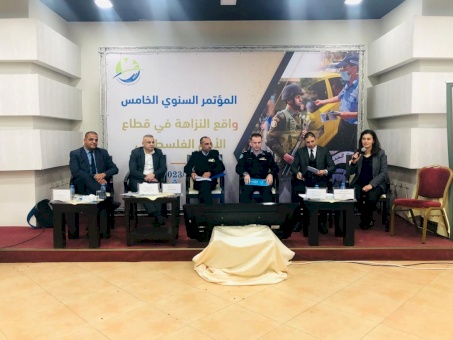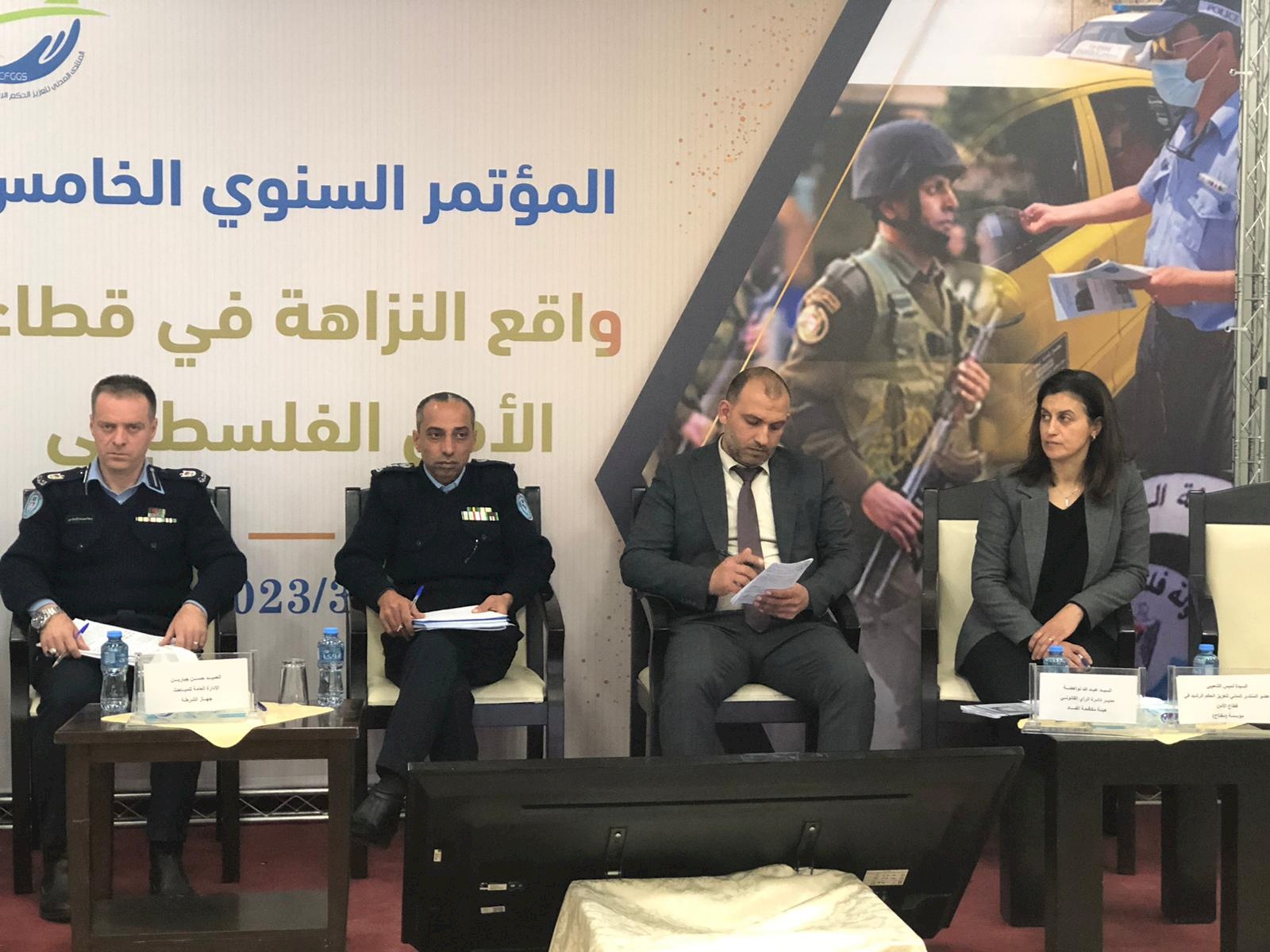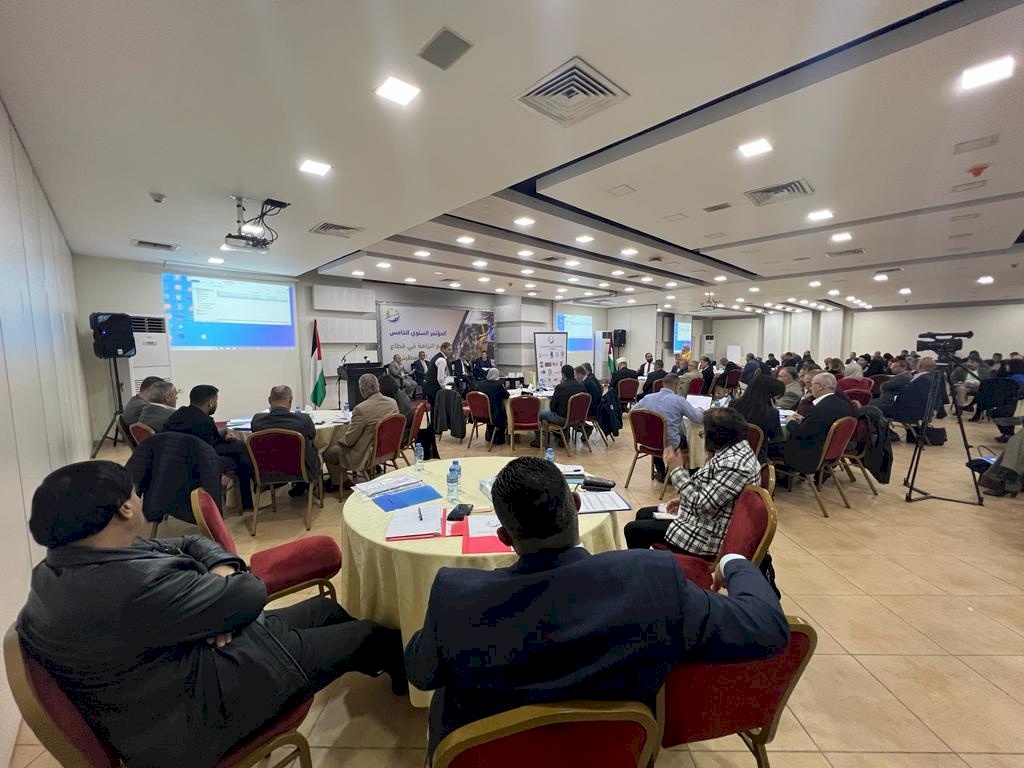
The absence of the Legislative Council has severely affected the “Medium” score that the Palestinian security sector received in the 2022 Integrity Index
The Civil Forum for Enhancing Good Governance in the Security Sector held its fifth conference entitled “Integrity in the Security Sector”
Ramallah- The Civil Forum for Enhancing Good Governance in the Security Sector held its fifth conference entitled “Integrity in the Security Sector”, with the participation of his Excellency the Deputy Minister of Interior Yousef Harb, as well as representatives of the security services, civil society organizations and several rights and media institutions.
The first session focused on releasing the findings of the integrity index in the Palestinian security sector for 2022. The second session addressed the risk of corruption in the security sector, presenting the risk of corruption in the police, including gender-based corruption (with the Criminal Investigations Department and the Traffic Administration as models), as well as the corruption risk at the Customs Police. The main goal was to shed the light on the main challenges that require policy and procedural interventions of stakeholders to protect those institutions from the risks of corruption.
Omar Rahhal, the coordinator for the Civil Forum for Enhancing Good Governance in the Security Sector, delivered the opening remarks at the conference. He explained that the conference is the culmination of continuous efforts during the year, which included several activities in cooperation with the security services. Rahhal stressed that the security services constitute a main pillar of integrity in governance, which requires attention to strengthen their integrity, neutrality, effectiveness and compliance with the law. He stressed the right of the citizens to access information and to participate in developing public policies, and called for holding general elections to restore democratic life in Palestine and revive the system of checks and balances, including the functions of the Legislative Council (PLC).
Rahhal also pointed out the Forum’s activities last year, culminating in several interventions that aimed at strengthening the governance of the Palestinian security services on one hand, and enhancing the culture and practice of community accountability by the civil society organizations, the media and the public on the other hand.
The Deputy Minister of Interior, Yousef Harb, welcomed the recommendations of the conference, asserting that they would be presented to the Palestinian decision-makers. He commended the positive atmosphere, cooperation, partnership and openness to the civil society, particularly the Civil Forum. He enumerated the joint contributions, most notably developing the Integrity Index, which was the outcome of cooperation between both parties, in addition to supporting the joint implementation of several youth and community accountability initiatives between the Forum and the security services.
Harb announced that the Ministry of Interior (MOI) shall launch the Palestinian Emergency Rapid Response Center (911), during the last quarter of the current year, in cooperation with several partners, including the Palestinian Police, the Civil Defence, The Ministry of Telecommunications and the Palestinian Red Crescent Society. The Center shall provide the initial response for any emergency in the Palestinian territories.

The Palestinian security sector received a medium score in 2022 Integrity Index
In its first session, the conference presented the findings of the Integrity Index in the Palestinian security sector for 2022, which received the score of 61, medium. This indicates that the risk or the possibility for corruption exists, and that the integrity system in the security sector requires further steps to complete the requirements of building an effective integrity system in the sector, although it has increased by 6 points from 2020.
The Index includes five aspects that affect the functioning of the security sector. The findings revealed discrepancies in the scores of the different aspects of integrity in the security sector. The procurements and tenders and the appointments and staff conduct received high scores, while the budget of the security sector received a low score. The political will and control over the intelligence services received very low scores.
The need to hold general elections and re-launch the National Security Council as a specialized supervisory and control governmental body
The Index provided several recommendations, including that the President issues a decree setting a date for general elections, to enable the citizens to choose their representatives to the political institutions, as this will reflect the political will to activate parliamentary control over the executive branch, including the security sector. It also recommended re-launching the National Security Council as a specialized governmental control body that supervises the policies of the intelligence services, their management and budgets. The Index recommended that the Council of Ministers (COM) develop a governmental system to classify documents and determine how to treat the security and governmental documents and the timeframe for releasing them, to enhance transparency in the security sector, until elections are held, and issue the Access to Information Law.
-Publish the detailed general budget, issue a special financial system for the security services and publish it in the national gazette, rather than continue using the unpublished extraordinary financial system, which the Minister of Finance renews annually.
-Establish the committee on the “quality of governance in the public sector”, consisting of figures who enjoy the necessary expertise and integrity to consider appointments of candidates to senior positions in the public sector (civil and security, including heads of the security services and the military institutions) according to objective criteria, and ensure that the candidates are suitable.
-Issue bylaws for procurements of a security nature, as provided in the Public Procurement Law, which cover all procurements of the security sector, and develop a procedural manual for public procurement and tenders in the security sector.
To watch a short movie about the security index, press here
General Remarks
In his commentary on the topic, Jihad Harb, senior researcher at AMAN, pointed out that the Index does not constitute a general and comprehensive evaluation of the performance of the security sector, but identifies the opportunities and threats of corruption to prevent them. He added that developing governance indices in the security sector contributes to developing and improving its performance. The report concluded that the conditions still constitute a source of concern, and require serious measures to strengthen the internal environment to prevent corruption. Moreover, it is necessary to hold general elections, since the absence of PLC has severely affected the Index. Harb added that the scores in the section on transparency in the security sector were the lowest among the three pillars of the integrity system in the security sector, as it was low compared to accountability, which received “medium”, and integrity, which received “advanced”.
The representative of the State Audit and Administrative Control Bureau (SAACB), Ayman Shaheen said that SAACB has been exercising its control over all the institutions that manage public money, and that the all the security services are subject to SAACB Control. SAACB made twelve reports about governance and the security, including four control reports (one on the National Security, another on the special rents of the security sector 2019-2020, a third on the Military Judiciary and the fourth on MOI). It also made 12 control reports in 2022 that covered three security-related institutions (buying, storing and dispensing medicines in the Military Medical Services, the General Directorate of Civil Defence and Al-Istiqlal University).
The Director of the Legal Affairs Department at MOI, Colonel Ammar Hamarsheh, said that MOI is keen on developing realistic plans to prevent corruption, optimize the use of the available resources and ensure good governance in the security sector institutions. He enumerated the accomplishments made in cooperation with the Forum and pointed out the training courses held on enhancing integrity and transparency in the security services, in addition to several training courses on the Code of Conduct, the Anti-Corruption Law and the Protection of Whistle-Blowers, the disclosure system and the financial status declarations. Those training courses targeted the staff of the security services.

Session Two: Corruption risk management in the security forces
During the second session, researcher Fadi Rabay’ah addressed the risks of corruption in the Police, including gender-based corruption risk (with the Criminal Investigations Department and the Traffic Administration as a model). He indicated that the study aimed at identifying the corruption risks in the Police through determining the track of the administrative decisions, focusing on the interventions that aim at achieving justice for women and men alike, to support the Police and help them create a work environment that enjoys integrity and is free of institutional and individual misconduct.
Chances for manipulating the crime scene evidence and abusing the power to issue good conduct certificates are high
The study revealed that the corruption index at the Criminal Investigations Department at the Police generally varies between medium and low, and the chances for manipulating the crime scene evidence and abusing the power to issue good conduct certificates for applicants are relatively high. Moreover, the chances for ignoring or overlooking crimes against women is also high. Rabay’ah pointed out that the impact of corruption-if it occurs- in the Criminal Investigations Department varies between very high to medium. The index also showed that the probability of corruption in the Traffic Administration is between medium and high. The index gave close results regarding the impact of corruption if it occurs.
Probability of gender-based violence in the traffic administration is very high, particularly regarding the points related to stopping vehicles and giving traffic tickets. There is a clear shortage in female police non-commissioned officers in the Traffic Administration and the Criminal Investigations Department. Both administrations are male dominated, which makes it unusual for women to enter their premises (whether suspects, witnesses or reporters of crimes).
The study recommended developing “standing operating procedures” for each of the Traffic Administration and the Criminal Investigations Department, which ensure that the staff of both administrations are fully and deeply informed of the ordinary and extraordinary work procedures that guide them when they face problems or take administrative decisions that have legal impact. The study also recommended installing cameras for the Traffic Administration that continuously record audio and video at work.

The need for female non-commissioned officers at the Traffic Administration and the Criminal Investigations Department
The study recommended engaging female non-commissioned officers from the Women Police Service at the Traffic Administration and the Criminal Investigations Department, as this would reduce the probability for gender-based corruption, noting that they should receive specialized and comprehensive training about the functions of those departments, which strengthens the chances for the success of this experience if applied.
General Remarks
The representative of the Traffic Administration, Jehad Qaddumi said that the prosecution is a control body that operates as an umbrella for the Police, and has the power to conduct the whole investigation. He pointed out that detention is part of their work while the Police do not have an investigative power. The Police inquires and gets affidavits. The Police sends the suspects to the Public Prosecution, which has the mandate to investigate. Qaddumi stressed that the Police has an automated electronic system, which constitutes an additional control tool that alleviates the risk of manipulating files, or overlooking them. He added that 25,000 tickets were issued for women, out of 247,000 tickets issued in 2022, indicating that there is a specialized traffic prosecution.
Brigadier-General Hassan Jabarin from the Criminal Investigations Department of the Police said that 39 female non-commissioned officers work in all the branches and carry out many functions. He added that a special procedural manual is under development and shall be approved and used in 11 governorates.
Abdallah Nawahdah from the Palestinian Anti-Corruption Commission (PACC) gave several comments, pointing out the need for cameras to record audio and video, and the need for a specialized administration for transferring criminal evidence, which should be recorded.
The need to strengthen the Customs police by increasing their budgets and providing them with qualified staff and logistic support
Researcher Mu’ayad Afanah presented a report about “the risk of corruption in the Customs Police”. He recommended enacting a detailed legislation for the Customs Police that identifies their tasks, powers, and work procedures, regulates their relationship with relevant ministries and commissions and updates the legislations on the Customs Police. He also pointed out the need for approving the Access to Information Law, to provide a legislative framework for releasing information, especially on the security services. He also pointed out the need for forming a ministerial committee from the relevant ministries, the Customs Police, SAACB, representatives of CSOs and the private sector, to decide on the seized products and their optimal use for the public good, according to legal provisions that regulate the process. He stressed the need for launching a website for the Customs Police, which must include their reports and documents, as well as information manuals about important topics such as (procedures of appointments and promotions, releasing information, disposing of seized products…). He stressed the need to strengthen the Customs Police through allocating the necessary budgets and providing them with the qualified staff and logistic support. He pointed out that the Palestinian universities, particularly Al-Istiqlal University, which provides the security services with male and female officers, must have specialized courses on integrity, transparency and fighting corruption, and that the Diploma on Customs taught at Al-Istiqlal University must include courses on corruption and its risks.
Ma’amoun Al-Abed, legal advisor at the Customs Police said that the they have taken measures to alleviate the risk of corruption, most notably that they report technically to the Ministry of Finance, and administratively to MOI. This alleviates the risks resulting from disposing of seized products, since the competent ministry is usually called upon to dispose of the seized products.
